关于节日的英文介绍
介绍中国传统节日的英语作文10篇
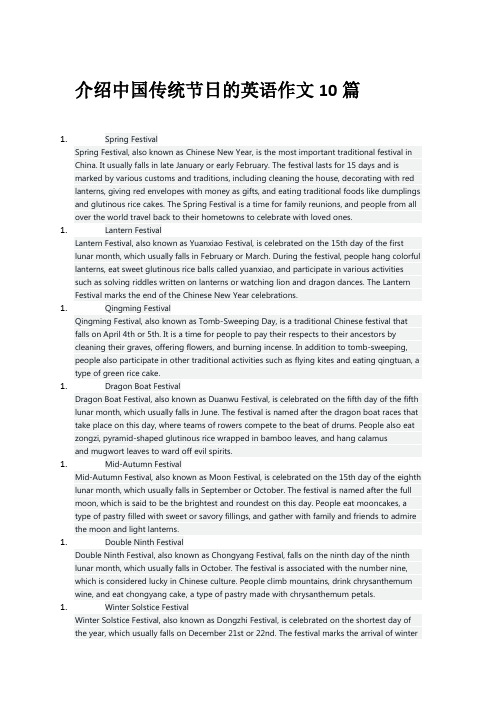
介绍中国传统节日的英语作文10篇1.Spring FestivalSpring Festival, also known as Chinese New Year, is the most important traditional festival in China. It usually falls in late January or early February. The festival lasts for 15 days and ismarked by various customs and traditions, including cleaning the house, decorating with red lanterns, giving red envelopes with money as gifts, and eating traditional foods like dumplings and glutinous rice cakes. The Spring Festival is a time for family reunions, and people from all over the world travel back to their hometowns to celebrate with loved ones.ntern FestivalLantern Festival, also known as Yuanxiao Festival, is celebrated on the 15th day of the first lunar month, which usually falls in February or March. During the festival, people hang colorful lanterns, eat sweet glutinous rice balls called yuanxiao, and participate in various activities such as solving riddles written on lanterns or watching lion and dragon dances. The Lantern Festival marks the end of the Chinese New Year celebrations.1.Qingming FestivalQingming Festival, also known as Tomb-Sweeping Day, is a traditional Chinese festival that falls on April 4th or 5th. It is a time for people to pay their respects to their ancestors bycleaning their graves, offering flowers, and burning incense. In addition to tomb-sweeping, people also participate in other traditional activities such as flying kites and eating qingtuan, a type of green rice cake.1.Dragon Boat FestivalDragon Boat Festival, also known as Duanwu Festival, is celebrated on the fifth day of the fifth lunar month, which usually falls in June. The festival is named after the dragon boat races that take place on this day, where teams of rowers compete to the beat of drums. People also eat zongzi, pyramid-shaped glutinous rice wrapped in bamboo leaves, and hang calamusand mugwort leaves to ward off evil spirits.1.Mid-Autumn FestivalMid-Autumn Festival, also known as Moon Festival, is celebrated on the 15th day of the eighth lunar month, which usually falls in September or October. The festival is named after the full moon, which is said to be the brightest and roundest on this day. People eat mooncakes, a type of pastry filled with sweet or savory fillings, and gather with family and friends to admire the moon and light lanterns.1.Double Ninth FestivalDouble Ninth Festival, also known as Chongyang Festival, falls on the ninth day of the ninth lunar month, which usually falls in October. The festival is associated with the number nine, which is considered lucky in Chinese culture. People climb mountains, drink chrysanthemum wine, and eat chongyang cake, a type of pastry made with chrysanthemum petals.1.Winter Solstice FestivalWinter Solstice Festival, also known as Dongzhi Festival, is celebrated on the shortest day of the year, which usually falls on December 21st or 22nd. The festival marks the arrival of winterand the beginning of longer days. People eat tangyuan, glutinous rice balls filled with sweet or savory fillings, and make offerings to ancestors and deities.1.Ghost FestivalGhost Festival, also known as Hungry Ghost Festival, falls on the 15th day of the seventh lunar month, which usually falls in August or September. The festival is a time to pay respects to the deceased and appease wandering ghosts. People offer food, incense, and paper money to the ghosts and perform traditional rituals to ward off bad luck.ba FestivalLaba Festival falls on the eighth day of the twelfth lunar month, which usually falls in January.The festival is named after the porridge, or laba porridge, that is traditionally eaten on this day.The porridge is made with rice, beans, and various nuts and fruits, and is believed to bring good luck and fortune for the coming year.1.Zhongyuan FestivalZhongyuan Festival, also known as Ghost Month, is a month-long festival that falls on the fifteenth day of the seventh lunar month, which usually falls in August or September. Thefestival is similar to the Ghost Festival, but is a more extended period of time where people pay respects to the deceased and offer food, incense, and paper money to the ghosts. People also perform traditional rituals to ward off bad luck during this time。
如何用英语介绍中国传统节日和文化?

【导语】⼤家经常可以看到关于中国传统节⽇和⽂化的话题。
节⽇是值得纪念的重要⽇⼦,⼀些节⽇源于传统习俗,如中国的春节、中秋节、清明节、重阳节等。
怎样⽤英⽂向⽼外介绍中国传统节⽇和⽂化呢?欢迎阅读⽆忧考为⼤家精⼼整理的“中国传统节⽇和⽂化的英语介绍”!更多相关讯息请关注⽆忧考!1. 元宵节: Lantern Festival2. 刺绣:embroidery3. 重阳节:Double-Ninth Festival4. 清明节:Tomb sweeping day5. 剪纸:Paper Cutting6. 书法:Calligraphy7. 对联:(Spring Festival) Couplets8. 象形⽂字:Pictograms/Pictographic Characters9. ⼈才流动:Brain Drain/Brain Flow10. 四合院:Siheyuan/Quadrangle11. 战国:Warring States12. 风⽔:Fengshui/Geomantic Omen13. 铁饭碗:Iron Bowl14. 函授部:The Correspondence Department15. 集体舞:Group Dance16. 黄⼟⾼原:Loess Plateau17. 红⽩喜事:Weddings and Funerals18. 中秋节:Mid-Autumn Day19. 结婚证:Marriage Certificate20. 儒家⽂化:Confucian Culture21. 附属学校:Affiliated school22. 古装⽚:Costume Drama23. 武打⽚:Chinese Swordplay Movie24. 元宵:Tangyuan/Sweet Rice Dumpling (Soup)25. ⼀国两制:One Country, Two Systems26. ⽕锅:Hot Pot27. 四⼈帮:Gang of Four28. 《诗经》:The Book of Songs29. 素质教育:Essential-qualities-oriented Education30. 《史记》:Historical Records/Records of the Grand Historian31. ⼤跃进:Great Leap Forward (Movement)32. 《西游记》:The Journey to the West33. 除⼣:Chinese New Year’s Eve/Eve of the Spring Festival34. 针灸:Acupuncture35. 唐三彩:Tri-color Pottery of the Tang Dynasty/ The Tang Tri-colored pottery36. 中国特⾊的社会主义:Chinese-charactered Socialist/Socialist with Chinesecharacteristics37. 偏旁:radical38. 孟⼦:Mencius39. 亭/阁: Pavilion/ Attic40. ⼤中型国有企业:Large and Medium-sized State-owned Enterprises41. *:gunpowder42. 农历:Lunar Calendar43. 印/玺:Seal/Stamp44. 物质精神⽂明建设:The Construction of Material Civilization and Spiritual Civilization45. 京剧:Beijing Opera/Peking Opera46. 秦腔:Crying of Qin People/Qin Opera47. 太极拳:Tai Chi48. 独⽣⼦⼥证:The Certificate of One-child49. 天坛:Altar of Heaven in Beijing50. ⼩吃摊:Snack Bar/Snack Stand51. 红双喜:Double Happiness52. 政治辅导员:Political Counselor/School Counselor53. 春卷:Spring Roll(s)54. 莲藕:Lotus Root55. 追星族:Star Struck56. 故宫博物院:The Palace Museum57. 相声:Cross-talk/Comic Dialogue58. 下岗:Lay off/Laid off59. 北京烤鸭:Beijing Roast Duck60. ⾼等⾃学考试:Self-taught Examination of Higher Education61. *:fireworks and firecracker62. 敦煌莫⾼窟:Mogao Caves63. 电视⼩品:TV Sketch/TV Skit64. ⾹港澳门同胞:Compatriots from Hong Kong and Macao65. *:Cultural Revolution66. 长江中下游地区:The Mid-low Reaches of Yangtze River67. 门当户对:Perfect Match/Exact Match68. 《⽔浒》:Water Margin/Outlaws of the Marsh69. 中外合资企业:Joint Ventures70. ⽂房四宝(笔墨纸砚):"The Four Treasure of the Study" "Brush, Inkstick, Paper, and Inkstone"71.兵马俑:cotta Warriors/ Terracotta Army72.旗袍:cheongsam。
英文版传统节日介绍

传统节日中英文介绍。
传统节日中英文介绍。
1、 腊八节腊八节是指农历的腊月初八。
在这天,中国人有喝腊八粥的习俗。
一般腊八粥是甜味粥,里面有干果和干鲜果品,当然每家的腊八粥做法都不营养,在我们家的腊八粥里一般有红小豆,香米,核桃,花生,小米等等。
豆,香米,核桃,花生,小米等等。
过了腊八节,各家就开始置办年货,打扫卫生,正式开始为春节的到来做准备了。
过了腊八节,各家就开始置办年货,打扫卫生,正式开始为春节的到来做准备了。
the laba Rice Porridge Festival“Laba Laba Festival” Festival” Festival” falls falls falls on on on the the the eighth day eighth day of of the twelfth the twelfth month month in in in lunar lunar lunar calendar. calendar. calendar. On On On that that that day, day, the majority Chinese have long followed the tradition of eating Laba rice rice porridge. porridge. porridge. Usually, Usually, Usually, the the rice porridge tastes sweet, with nuts and dried fruit, but different families have different ingredients in the porridge. My family usually make porridge with small red beans ,fragrant rice ,walnut ,peanut and millet. Laba Festival also marks the beginning of preparing for spring festival. Some families begin to do spring festival shopping and clean their houses after that day. 2、小年小年又叫“祭灶节”,在农历的12月23或者24。
中国传统节日英文介绍
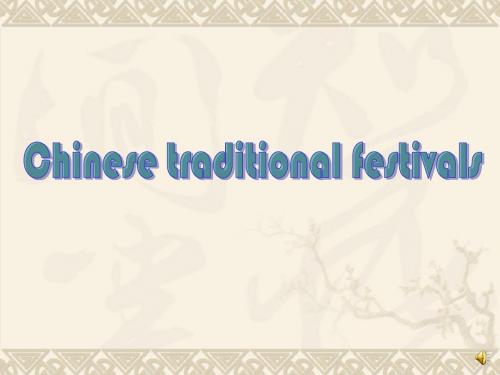
In China, the most traditional and popular Spring Festival food is dumpling, which looks like the moon with vegetables and meat mixed in it. The Chinese name of dumpling is “JIAO ZI”, ”JIAO” means ”cross”, ”ZI” is Chinese traditional time represents “24:00”, so the Chinese word “JIAO ZI” means “cross 24:00”, just the dividing point of last year and next year. So when it comes to 24:00, every family begins eating dumplings.
The
Double Ninth Festival(重阳节)
Ancient Chinese believes nine represents sun, the brightest thing, September 9th has two nine, the sun is doubled, so call it Double Ninth Festival. Nine also means Long in Chinese words, so the Double Ninth Festival is also recognized The Old Festival. In Double Ninth Festival, people go to their ancestors’ tombs to worship with coat for winner.
如何用英文单词介绍春节
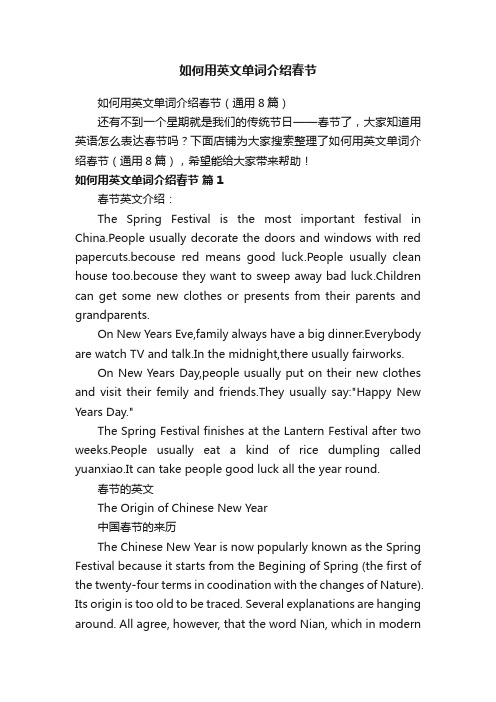
如何用英文单词介绍春节如何用英文单词介绍春节(通用8篇)还有不到一个星期就是我们的传统节日——春节了,大家知道用英语怎么表达春节吗?下面店铺为大家搜索整理了如何用英文单词介绍春节(通用8篇),希望能给大家带来帮助!如何用英文单词介绍春节篇1春节英文介绍:The Spring Festival is the most important festival in China.People usually decorate the doors and windows with red papercuts.becouse red means good luck.People usually clean house too.becouse they want to sweep away bad luck.Children can get some new clothes or presents from their parents and grandparents.On New Years Eve,family always have a big dinner.Everybody are watch TV and talk.In the midnight,there usually fairworks.On New Years Day,people usually put on their new clothes and visit their femily and friends.They usually say:"Happy New Years Day."The Spring Festival finishes at the Lantern Festival after two weeks.People usually eat a kind of rice dumpling called yuanxiao.It can take people good luck all the year round.春节的英文The Origin of Chinese New Year中国春节的来历The Chinese New Year is now popularly known as the Spring Festival because it starts from the Begining of Spring (the first of the twenty-four terms in coodination with the changes of Nature). Its origin is too old to be traced. Several explanations are hanging around. All agree, however, that the word Nian, which in modernChinese solely means "year", was originally the name of a monster beast that started to prey on people the night before the beginning of a new year.One legend goes that the beast Nian had a very big mouth that would swallow a great many people with one bite. People were very scared. One day, an old man came to their rescue, offering to subdue Nian. T o Nian he said, "I hear say that you are very capable, but can you swallow the other beasts of prey on earth instead of people who are by no means of your worthy opponents?" So, it did swallow many of the beasts of prey on earth that also harrassed people and their domestic animals from time to time.After that, the old man disappeared riding the beast Nian. He turned out to be an immortal god. Now that Nian is gone and other beasts of prey are also scared into forests, people begin to enjoy their peaceful life. Before the old man left, he had told people to put up red paper decorations on their windows and doors at each years end to scare away Nian in case it sneaked back again, because red is the color the beast feared the most.From then on, the tradition of observing the conquest of Nian is carried on from generation to generation. The term "Guo Nian", which may mean "Survive the Nian" becomes today "Celebrate the (New) Year" as the word "guo" in Chinese having both the meaning of "pass-over" and "observe". The custom of putting up red paper and firing fire-crackers to scare away Nian should it have a chance to run loose is still around. However, people today have long forgotten why they are doing all this, except that they feel the color and the sound add to the excitement of the celebration.春节常用英文过年 Guo-nian; have the Spring Festival对联 poetic couplet: two successive rhyming lines in poetry 春联 Spring Festival couplets剪纸 paper-cuts年画 New Year paintings买年货 special purchases for the Spring Festival ; do Spring Festival shopping敬酒 propose a toast灯笼 lantern: a portable light灯会 exhibit of lanterns守岁 staying-up拜年 pay New Years call; give New Years greetings; New Years visit禁忌 taboo去晦气 get rid of the ill- fortune祭祖宗 offer sacrifices to ones ancestors压岁钱 gift money; money given to children as a lunar New Year gift辞旧岁 bid farewell to the old year扫房 spring cleaning; general house-cleaning八宝饭 eight treasures rice pudding糖果盘 candy tray什锦糖 assorted candies - sweet and fortune蜜冬瓜 candied winter melon - growth and good health西瓜子 red melon seed - joy, happiness, truth and sincerity 金桔 cumquat - prosperity糖莲子 candied lotus seed - many descendents to come糖藕 candied lotus root - fulfilling love relationship红枣 red dates - prosperity花生糖 peanut candy - sweet春节的英文祝福语--给父母亲Mom and Dad: Thank you for everything this holiday season!爸爸妈妈:值此佳节,感谢您们所给予的一切。
用英文介绍一个节日【关于节日的英文文章阅读】
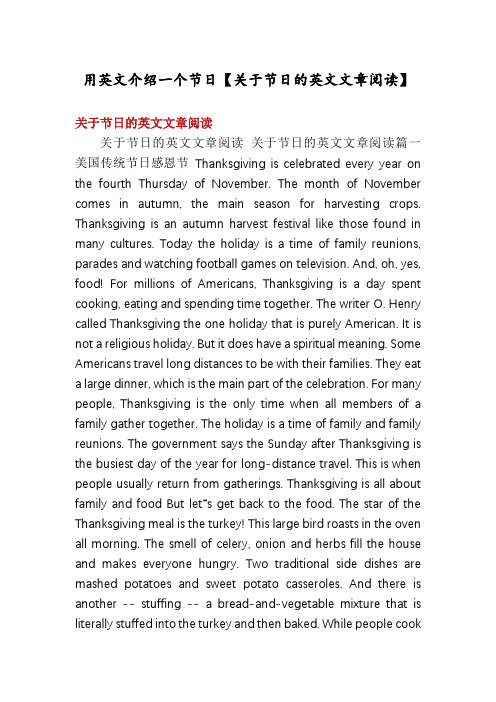
用英文介绍一个节日【关于节日的英文文章阅读】关于节日的英文文章阅读关于节日的英文文章阅读关于节日的英文文章阅读篇一美国传统节日感恩节Thanksgiving is celebrated every year on the fourth Thursday of November. The month of November comes in autumn, the main season for harvesting crops. Thanksgiving is an autumn harvest festival like those found in many cultures. Today the holiday is a time of family reunions, parades and watching football games on television. And, oh, yes, food! For millions of Americans, Thanksgiving is a day spent cooking, eating and spending time together. The writer O. Henry called Thanksgiving the one holiday that is purely American. It is not a religious holiday. But it does have a spiritual meaning. Some Americans travel long distances to be with their families. They eat a large dinner, which is the main part of the celebration. For many people, Thanksgiving is the only time when all members of a family gather together. The holiday is a time of family and family reunions. The government says the Sunday after Thanksgiving is the busiest day of the year for long-distance travel. This is when people usually return from gatherings. Thanksgiving is all about family and food But let“s get back to the food. The star of the Thanksgiving meal is the turkey! This large bird roasts in the oven all morning. The smell of celery, onion and herbs fill the house and makes everyone hungry. Two traditional side dishes are mashed potatoes and sweet potato casseroles. And there is another -- stuffing -- a bread-and-vegetable mixture that is literally stuffed into the turkey and then baked. While people cookthe Thanksgiving meal and talk with family members and friends, others might be watching American football games on television. Two American traditions, Thanksgiving Day parade and football Over the years, Americans have added this tradition to theirThanksgiving celebrations. A number of football games are played on Thanksgiving Day. Another tradition is the television broadcast of Macy“s Thanksgiving Day Parade. The parade takes place every year in New York City. Employees of the Macy"s store on Herald Square organized the first parade in 1924. Many of the workers were immigrants and wanted to hold a big parade like the ones in Old World Europe. So they dressed in special costumes and borrowed some animals from the zoo. They also carried small balloons that floated just overhead. And then sometime in the afternoon, the dinner table is set. It is time for what everyone has been waiting for. Dinner is served! Some families have more than one dinner table at Thanksgiving. Children may eat together at their own table. Usually, the people who are invited to dinner belong to the same family. But anyone can bring a friend. In fact, many Americans live far away from family members. So, getting together at Thanksgiving is not always possible. Many people in this situation have a dinner party and invite their friends who are also without family for the holidays. Serving those less fortunate It is important to remember that the United States is home to many poor and homeless people. They cannot buy a Thanksgiving dinner or spend the holiday with friends and family. All across the country, religious and service organizations provide holiday meals for older adults, the homeless and the poor. Whether you are eating with family and friends or serving meals to the homeless, Thanksgiving is atime to give thanks. Before the meal begins, it is traditional for everyone to say a few words about what they are most thankful for. 关于节日的英文文章阅读篇二美国的节日和假日。
中国节日英语演讲稿5篇

中国节日英语演讲稿5篇中国节日英语演讲稿篇1假如你叫李华,你的美国笔友tom对中国的传统节日非常感兴趣。
他想请你介绍你最喜欢的一个节日,如中秋节、端午节、春节等,你通常是怎么庆祝的,以及你喜欢这个节日的原因。
请你根据他的问题回复邮件。
提示词语:eat, get together, share, happy, specialhi! tom,i’m glad to hear that you are interested in traditional chinese festivals.my favorite festival is the mid-autumn festival. it usually comes in september or october. on that day, our family members usually get together and have a nice meal. after that, i always admire the moon and share mooncakes with my families.i love this festival because i like eating mooncakes. they are in the shape of a full moon. they carry people’s wishes to the families they love and miss.in short, the mid-autumn festival is a day of pleasure and happiness. i hope that my letter will help you know more about chinese festivals.yours,li hua中国节日英语演讲稿篇2尊敬的老师,同学们:大家好!随着清明节的即将来临,各地也开启祭扫模式。
西方传统节日英文介绍

西方传统节日英文介绍,中英对照节日简介了解西方文化的时候,无论是通过网络或者书籍,我们都习惯看中文译本。
其实一门语言一旦被翻译,很多意思都会产生偏差,真正想了解一个东西,最好是通过原文来理解。
西方节日在中国传播发展,关于西方节日的介绍大家有没有了解呢?下面,一起来看看中英文对照版本的西方节日介绍,是不是跟你所知道的一样呢?1、复活节EasterEaster is a time of springtime festivals. In Christian countries Easter is celebrated as the religious holiday commemorating the resurrection of Jesus Christ, the son of God. But the celebrations of Easter have many customs and legends that are pagan in origin and have nothing to do with Christianity.Traditions associated with the festival survive in the Easter rabbit, a symbol of fertility, and in colored Easter eggs, originally painted with bright colors to represent the sunlight of spring, and used in Easter-egg rolling contests or given as gifts.复活节是春季的节日。
在信基督教的国家里,复活节是为纪念基督耶稣的复活而举行的宗教节日。
但是复活节有许多习俗和传说的由来都是非宗教的,它们与基督教没有任何关系。
与节日密切联系的一些传统有象复活节的野兔,它是作为繁殖生长的象征;还有复活节的彩蛋。
西方传统节日英文介绍
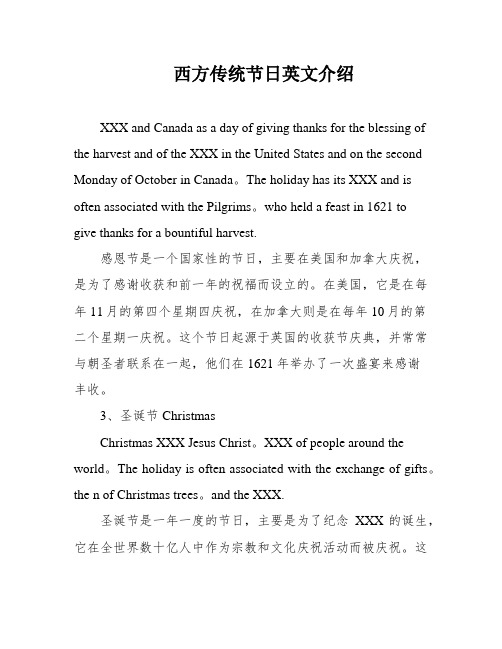
西方传统节日英文介绍XXX and Canada as a day of giving thanks for the blessing of the harvest and of the XXX in the United States and on the second Monday of October in Canada。
The holiday has its XXX and is often associated with the Pilgrims。
who held a feast in 1621 togive thanks for a bountiful harvest.感恩节是一个国家性的节日,主要在美国和加拿大庆祝,是为了感谢收获和前一年的祝福而设立的。
在美国,它是在每年11月的第四个星期四庆祝,在加拿大则是在每年10月的第二个星期一庆祝。
这个节日起源于英国的收获节庆典,并常常与朝圣者联系在一起,他们在1621年举办了一次盛宴来感谢丰收。
3、圣诞节ChristmasChristmas XXX Jesus Christ。
XXX of people around the world。
The holiday is often associated with the exchange of gifts。
the n of Christmas trees。
and the XXX.圣诞节是一年一度的节日,主要是为了纪念XXX的诞生,它在全世界数十亿人中作为宗教和文化庆祝活动而被庆祝。
这个节日常常与礼物的交换、圣诞树的装饰以及展示诞生场景的复杂展示有关。
4、情人节Valentine's DayXXX February 14th。
and is associated with XXX。
a third-century Roman saint associated with courtly love。
中国传统节日介绍英文版

中国传统节日介绍英文版.元旦 New Year' s Day Jan.1国际劳动妇女节 International Working women' s Day(wornen's Day) Mar.8国际劳动节 nternatlonal Labor Day(May. Day) May.1中国青年节 Chinese Youth Day May.4国际儿童节 International Children's Day(Children's Day) June .1中国共产党诞生纪念日( 党的生日) Anniversary of the Foundlng of the ChineseCommunist Party ( the Party' s Birthday) July .1建军节 Army Day August .1教师节 Teachers , Day Sept.1国庆节 National Dey October.1中国传统节日春节 the Sprlng Festival ( NewYearls Day of the Chinese lunar calendar)农历正月初一元宵节(灯节) the Lantern Festival 农历正月十五清明节 the Qing Ming Festival 四月五日前后端午节 the Dragon-Boat Festiva 农历五月初五中秋节 the MidAutumn Festival(the Moon Festival)农历八月十五重阳节 the Double Ninth Festival 农历九月初九元旦(1月1日)NewYear'sDay春节(农历一月一日)theSpringFestival元宵节(农历一月十五日)theLanternFestival国际劳动妇女节(3月8日)InternationalWorkingWomen'sDay植树节(3月12日)ArborDay邮政节(3月20日)PostalDay世界气象节(3月23日)WorldMeteorologyDay清明节(4月5日)ChingMingFestival;Tomb-sweepingFestival国际劳动节(5月1日)InternationalLabourDay中国青年节(5月4日)ChineseYouthDay护士节(5月12日)Nurses'Festival端午节(农历五月初五)theDragonBoatFestival国际儿童节(6月1日)InternationalChildren'sDay中国共产党成立纪念日(7月1日)theParty'sBirthday建军节(8月1日)theArmy'sDay中秋节(农历八月十五)Mid-autumn(Moon)Festival教师节(9月10日)Teachers'Day重阳节(农历九月九日)Double-ninthDay国庆节(10月1日)NationalDay除夕(农历十二月三十日)NewYear'sEve阳历节日1月1日元旦(New Year's Day)2月2日世界湿地日(World Wetlands Day)2月14日情人节(Valentine's Day)3月3日全国爱耳日3月5日青年志愿者服务日3月8日国际妇女节(International Women' Day)3月9日保护母亲河日3月12日中国植树节(China Arbor Day)3月14日白色情人节(White Day)3月14日国际警察日(International Policemen' Day)3月15日世界消费者权益日(World Consumer Right Day)3月21日世界森林日(World Forest Day)3月21日世界睡眠日(World Sleep Day)3月22日世界水日(World Water Day)3月23日世界气象日(World Meteorological Day)3月24日世界防治结核病日(World Tuberculosis Day)4月1日愚人节(April Fools' Day)4月5日清明节(Tomb-sweeping Day)4月7日世界卫生日(World Health Day)4月22日世界地球日(World Earth Day)4月26日世界知识产权日(World Intellectual Property Day)5月1日国际劳动节(International Labour Day)5月3日世界哮喘日(World Asthma Day)5月4日中国青年节(Chinese Youth Day)5月8日世界红十字日(World Red-Cross Day)5月12日国际护士节(International Nurse Day)5月15日国际家庭日(International Family Day)5月17日世界电信日(World Telecommunications Day)5月20日全国学生营养日5月23日国际牛奶日(International Milk Day)5月31日世界无烟日(World No-Smoking Day)6月1日国际儿童节(International Children's Day)6月5日世界环境日(International Environment Day)6月6日全国爱眼日6月17日世界防治荒漠化和干旱日(World Day to combat desertification)6月23日国际奥林匹克日(International Olympic Day)6月25日全国土地日6月26日国际禁毒日(International Day Against Drug Abuse and IllicitTrafficking)7月1日中国共产党诞生日(Anniversary of the Founding of the Chinese Communist Party)7月1日国际建筑日(International Architecture Day)7月7日中国人民抗日战争纪念日7月11日世界人口日(World Population Day)8月1日中国人民解放军建军节(Army Day)8月12日国际青年节(International Youth Day)9月8日国际扫盲日(International Anti-illiteracy Day)9月10日中国教师节(Teacher's Day)9月16日中国脑健康日9月16日国际臭氧层保护日(International Day for the Preservation of the Ozone Layer)9月20日全国爱牙日9月21日世界停火日(World Cease-fire Day)9月27日世界旅游日(World Tourism Day)10月1日中华人民共和国国庆节(National Day)10月1日国际音乐日(International Music Day)10月1日国际老年人日(International Day of Older Persons)10月4日世界动物日(World Animal Day)10月5日世界教师日(World Teachers' Day)(联合国教科文组织确立)10月8日全国高血压日10月9日世界邮政日(World Post Day)10月10日世界精神卫生日(World Mental Health Day)10月14日世界标准日(World Standards Day)10月15日国际盲人节(International Day of the Blind)10月15日世界农村妇女日(World Rural Women's Day)10月16日世界粮食日(World Food Day)10月17日国际消除贫困日(International Day for the Eradication of Poverty) 10月24日联合国日(United Nations Day)10月24日世界发展新闻日(World Development Information Day)10月28日中国男性健康日10月29日国际生物多样性日(International Biodiversity Day)10月31日万圣节(Halloween)11月8日中国记者节11月9日消防宣传日11月14日世界糖尿病日(World Diabetes Day)11月17日国际大学生节11月25日国际消除对妇女的暴力日(International Day For the elimination of Violence against Women)12月1日世界爱滋病日(World AIDS Day)12月3日世界残疾人日(World Disabled Day)12月4日全国法制宣传日12月9日世界足球日(World Football Day)12月25日圣诞节(Christmas Day)12月29日国际生物多样性日(International Biological Diversity Day)1月最后一个星期日国际麻风节3月最后一个完整周的星期一中小学生安全教育日春分月圆后的第一个星期日复活节(Easter Monday)(有可能是3月22-4月25日间的任一天)5月第二个星期日母亲节(Mother's Day)5月第三个星期日全国助残日6月第三个星期日父亲节(Father's Day)9月第三个星期二国际和平日(International Peace Day)9月第三个星期六全国国防教育日9月第四个星期日国际聋人节(International Day of the Deaf)10月的第一个星期一世界住房日(World Habitat Day)10月的第二个星斯一加拿大感恩节(Thanksgiving Day)10月第二个星期三国际减轻自然灾害日(International Day for Natural Disaster Reduction)10月第二个星期四世界爱眼日(World Sight Day)11月最后一个星期四美国感恩节(Thanksgiving Day)农历节日农历正月初一春节(the Spring Festival)农历正月十五元宵节(Lantern Festival)农历五月初五端午节(the Dragon-Boat Festival)农历七月初七乞巧节(中国情人节)(Double-Seventh Day)农历八月十五中秋节(the Mid-Autumn Festival)农历九月初九重阳节(the Double Ninth Festival)农历腊月初八腊八节(the laba Rice Porridge Festival)农历腊月二十四传统扫房日。
中国传统节日英文介绍
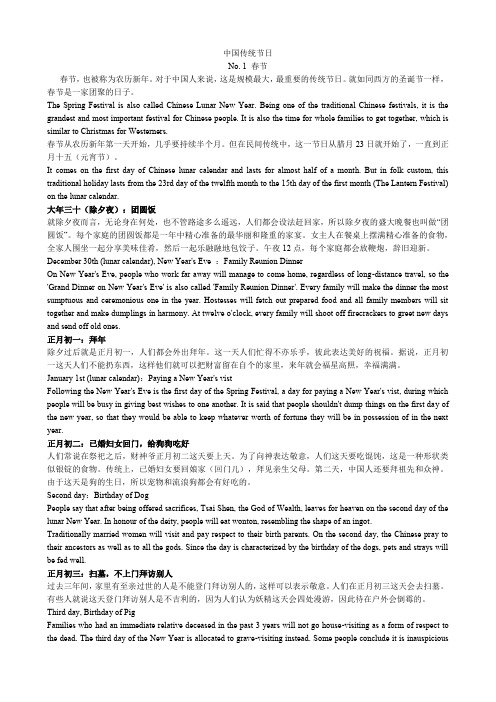
中国传统节日No. 1 春节春节,也被称为农历新年。
对于中国人来说,这是规模最大,最重要的传统节日。
就如同西方的圣诞节一样,春节是一家团聚的日子。
The Spring Festival is also called Chinese Lunar New Year. Being one of the traditional Chinese festivals, it is the grandest and most important festival for Chinese people. It is also the time for whole families to get together, which is similar to Christmas for Westerners.春节从农历新年第一天开始,几乎要持续半个月。
但在民间传统中,这一节日从腊月23日就开始了,一直到正月十五(元宵节)。
It comes on the first day of Chinese lunar calendar and lasts for almost half of a month. But in folk custom, this traditional holiday lasts from the 23rd day of the twelfth month to the 15th day of the first month (The Lantern Festival) on the lunar calendar.大年三十(除夕夜):团圆饭就除夕夜而言,无论身在何处,也不管路途多么遥远,人们都会设法赶回家,所以除夕夜的盛大晚餐也叫做“团圆饭”。
每个家庭的团圆饭都是一年中精心准备的最华丽和隆重的家宴。
女主人在餐桌上摆满精心准备的食物,全家人围坐一起分享美味佳肴,然后一起乐融融地包饺子。
午夜12点,每个家庭都会放鞭炮,辞旧迎新。
中国传统节日英文介绍
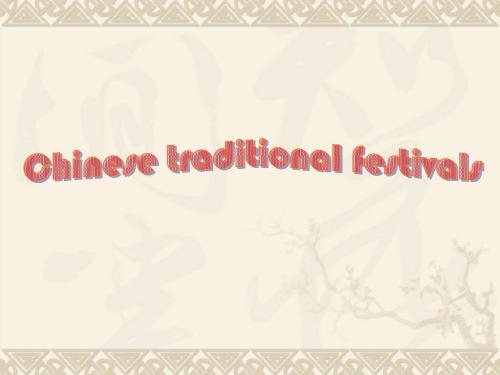
Spring
Festival Lantern Festival Dragon Boat Festival Mid-Autumn Day The Double Ninth Festival
The first day of the first lunar month
Some lanterns have puzzles on them, called lantern puzzle(灯 谜), the one who gets the answer could receive small presents and be happy for his intelligence. The traditional food for Lantern Festival is rice glue ball(元宵). The rice glue ball’s shape is just like the full moon appears in the sky. This kind of dessert is especially welcomed by children.
Chinese believes nine represents sun, the brightest thing, September 9th has two nine, the sun is doubled, so call it Double Ninth Festival. Nine also means Long in Chinese words, so the Double Ninth Festival is also recognized The Old Festival. In Double Ninth Festival, people go to their ancestors’ tombs to worship(祭拜) with coat for winner.
英语范文介绍端午节优秀8篇
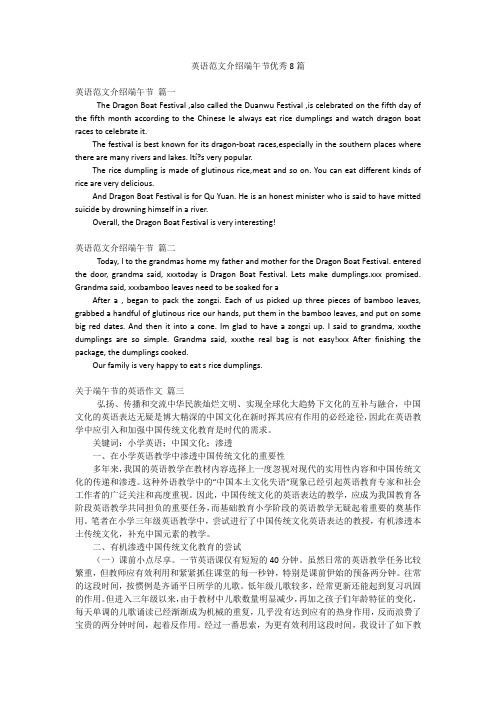
英语范文介绍端午节优秀8篇英语范文介绍端午节篇一The Dragon Boat Festival ,also called the Duanwu Festival ,is celebrated on the fifth day of the fifth month according to the Chinese le always eat rice dumplings and watch dragon boat races to celebrate it.The festival is best known for its dragon-boat races,especially in the southern places where there are many rivers and lakes. Ití?s very popular.The rice dumpling is made of glutinous rice,meat and so on. You can eat different kinds of rice are very delicious.And Dragon Boat Festival is for Qu Yuan. He is an honest minister who is said to have mitted suicide by drowning himself in a river.Overall, the Dragon Boat Festival is very interesting!英语范文介绍端午节篇二Today, I to the grandmas home my father and mother for the Dragon Boat Festival. entered the door, grandma said, xxxtoday is Dragon Boat Festival. Lets make dumplings.xxx promised. Grandma said, xxxbamboo leaves need to be soaked for aAfter a , began to pack the zongzi. Each of us picked up three pieces of bamboo leaves, grabbed a handful of glutinous rice our hands, put them in the bamboo leaves, and put on some big red dates. And then it into a cone. Im glad to have a zongzi up. I said to grandma, xxxthe dumplings are so simple. Grandma said, xxxthe real bag is not easy!xxx After finishing the package, the dumplings cooked.Our family is very happy to eat s rice dumplings.关于端午节的英语作文篇三弘扬、传播和交流中华民族灿烂文明、实现全球化大趋势下文化的互补与融合,中国文化的英语表达无疑是博大精深的中国文化在新时挥其应有作用的必经途径,因此在英语教学中应引入和加强中国传统文化教育是时代的需求。
各种中国传统节日的英文介绍

各种中国传统节日的英文介绍
以下是几个中国传统节日的英文介绍:
1.春节(Spring Festival):春节是中国最重要的传统节日,通常在农历正
月初一庆祝。
这个节日标志着新年的开始,人们会进行一系列的庆祝活动,如贴春联、吃团圆饭、放烟花爆竹等。
2.元宵节(Lantern Festival):元宵节是春节之后的第一个重要节日,通常
在农历正月十五庆祝。
这个节日主要是庆祝春节后的第一个满月,人们会吃元宵、赏花灯、猜灯谜等。
3.清明节(Qingming Festival):清明节是中国传统的祭祀节日,通常在公
历4月4日或5日庆祝。
这个节日是祭祖和扫墓的日子,人们会去祭拜祖先、献上鲜花、焚香等。
4.端午节(Dragon Boat Festival):端午节是中国传统节日之一,通常在农
历五月初五庆祝。
这个节日主要是为了纪念古代爱国诗人屈原,人们会赛龙舟、吃粽子、喝雄黄酒等。
5.中秋节(Mid-Autumn Festival):中秋节是中国传统节日之一,通常在
农历八月十五庆祝。
这个节日是庆祝秋收的日子,人们会赏月、吃月饼、猜灯谜等。
6.重阳节(Double Ninth Festival):重阳节是中国传统节日之一,通常在
农历九月初九庆祝。
这个节日主要是为了祈求长寿和平安,人们会登高、赏菊、吃重阳糕等。
以上是一些中国传统节日的英文介绍,希望能够帮助到您。
中国节日作文英文介绍
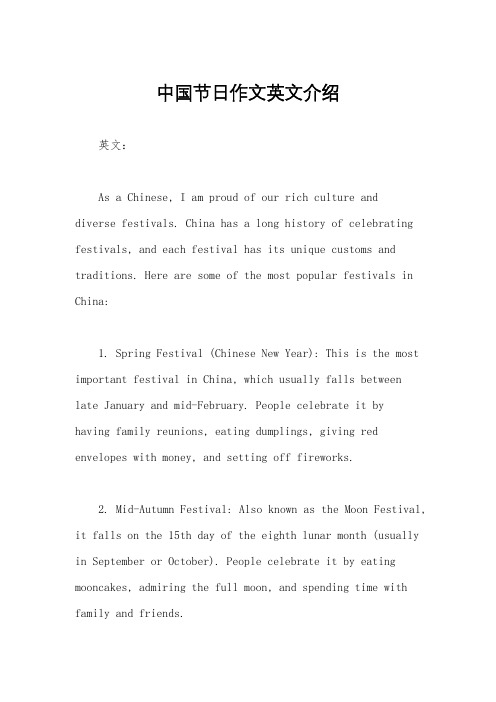
中国节日作文英文介绍英文:As a Chinese, I am proud of our rich culture anddiverse festivals. China has a long history of celebrating festivals, and each festival has its unique customs and traditions. Here are some of the most popular festivals in China:1. Spring Festival (Chinese New Year): This is the most important festival in China, which usually falls betweenlate January and mid-February. People celebrate it byhaving family reunions, eating dumplings, giving red envelopes with money, and setting off fireworks.2. Mid-Autumn Festival: Also known as the Moon Festival, it falls on the 15th day of the eighth lunar month (usually in September or October). People celebrate it by eating mooncakes, admiring the full moon, and spending time with family and friends.3. Dragon Boat Festival: This festival is held on the fifth day of the fifth lunar month (usually in June).People celebrate it by racing dragon boats, eating zongzi (a type of glutinous rice wrapped in bamboo leaves), and drinking realgar wine.4. Lantern Festival: This festival is held on the 15th day of the first lunar month (usually in February or March). People celebrate it by lighting and releasing lanterns, solving riddles written on lanterns, and eating tangyuan (a type of glutinous rice ball).These festivals not only provide opportunities for people to have fun and relax but also reflect the Chinese culture and values. For example, the Spring Festival emphasizes the importance of family and reunion, while the Mid-Autumn Festival highlights the virtue of gratitude and harmony. As a Chinese, I feel lucky to be able toexperience these festivals and appreciate the cultural richness they bring to my life.中文:作为一个中国人,我为我们丰富的文化和多样的节日感到自豪。
介绍节日的英文作文
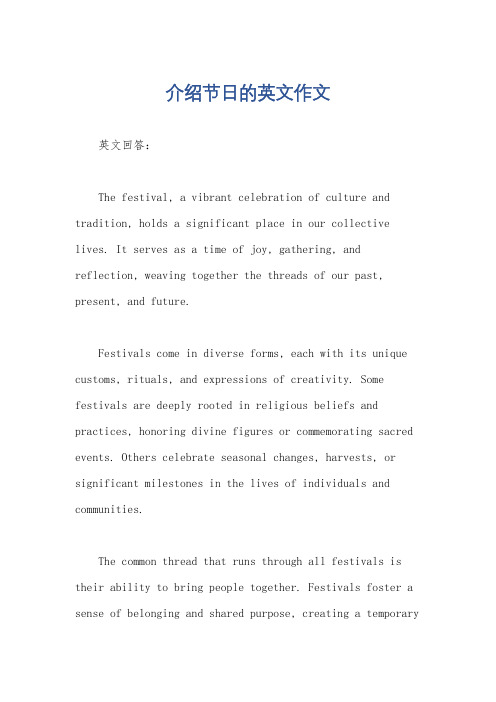
介绍节日的英文作文英文回答:The festival, a vibrant celebration of culture and tradition, holds a significant place in our collective lives. It serves as a time of joy, gathering, and reflection, weaving together the threads of our past, present, and future.Festivals come in diverse forms, each with its unique customs, rituals, and expressions of creativity. Some festivals are deeply rooted in religious beliefs and practices, honoring divine figures or commemorating sacred events. Others celebrate seasonal changes, harvests, or significant milestones in the lives of individuals and communities.The common thread that runs through all festivals is their ability to bring people together. Festivals foster a sense of belonging and shared purpose, creating a temporarycommunity where social barriers dissolve and hearts connect. They provide a space for individuals to express themselves, showcase their talents, and engage in communal activities that strengthen social bonds.The preparations for a festival often begin weeks or even months in advance, as communities work together to create an atmosphere of excitement and anticipation.Streets are adorned with colorful decorations, homes are cleaned and decorated, and special foods are prepared. The arrival of the festival day is greeted with a flurry of activity as people don their finest attire, gather inpublic spaces, and participate in the festivities.During the festival, traditional music, dance, and performances take center stage, showcasing the cultural heritage of the community. People engage in games, competitions, and other recreational activities that add to the festive spirit. Food plays a significant role in many festivals, with special dishes and delicacies beingprepared and shared.Beyond the immediate joy and merriment, festivals also serve as opportunities for reflection and introspection. They provide a chance to pause, appreciate the present moment, and connect with our cultural roots. Festivals remind us of the importance of our shared values, traditions, and beliefs, fostering a sense of continuity and purpose in the midst of life's complexities.In conclusion, festivals are a vital part of human culture, connecting us to our past, present, and future. They are a time for celebration, joy, and reflection, enriching our lives with a sense of community, belonging, and cultural identity.中文回答:节日是文化和传统的盛大庆典,在我们共同的生活中占有重要地位。
英语范文节日介绍

英语范文节日介绍英文回答:Today I would like to introduce a few important holidays around the world. Holidays are special occasions that bring people together to celebrate, reflect, and connect with one another.First of all, Christmas is one of the most widely celebrated holidays in the world. It is a Christian holiday that commemorates the birth of Jesus Christ. People celebrate Christmas by decorating their homes, exchanging gifts, and spending time with family and friends.Next, there is New Year's Day, which is celebrated on January 1st in many countries around the world. It is a time to reflect on the past year and make resolutions for the new one. People often gather with loved ones to watch fireworks and countdown to the new year.Another important holiday is Thanksgiving, which is celebrated in the United States and Canada. It is a time to give thanks for the blessings in one's life and to spendtime with family and friends. Traditional foods such as turkey, stuffing, and pumpkin pie are often served.Finally, there is Chinese New Year, which is celebratedin many parts of the world by people of Chinese descent. It is a time to honor ancestors and deities, and to bring good luck and prosperity for the coming year. People celebrate with traditional foods, decorations, and dragon and lion dances.中文回答:今天我想介绍一些世界各地重要的节日。
关于节日的英文作文3篇
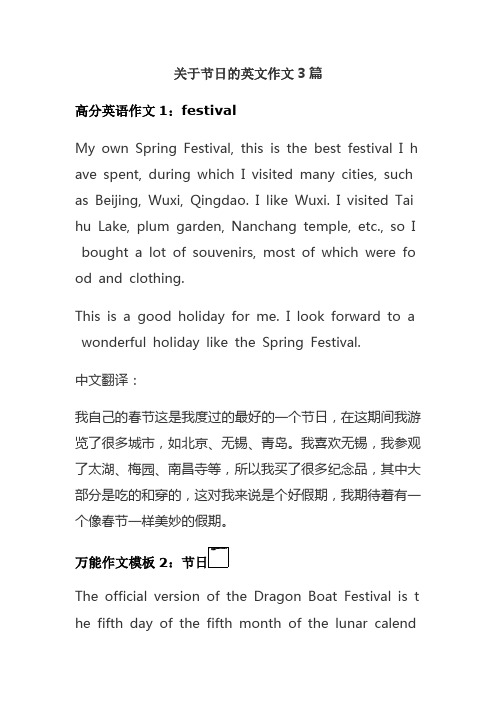
关于节日的英文作文3篇高分英语作文1:festivalMy own Spring Festival, this is the best festival I h ave spent, during which I visited many cities, such as Beijing, Wuxi, Qingdao. I like Wuxi. I visited Tai hu Lake, plum garden, Nanchang temple, etc., so I bought a lot of souvenirs, most of which were fo od and clothing.This is a good holiday for me. I look forward to a wonderful holiday like the Spring Festival.中文翻译:我自己的春节这是我度过的最好的一个节日,在这期间我游览了很多城市,如北京、无锡、青岛。
我喜欢无锡,我参观了太湖、梅园、南昌寺等,所以我买了很多纪念品,其中大部分是吃的和穿的,这对我来说是个好假期,我期待着有一个像春节一样美妙的假期。
万能作文模板2:节日The official version of the Dragon Boat Festival is t he fifth day of the fifth month of the lunar calendar. There are many stories about the origin of the festival. The most popular and widely accepted vie w is Qu Yuan, Minister of the Warring States perio d at the end of the Zhou Dynasty.China, as we know now, has fallen into a state of division and conflict when the Zhou Dynasty ruled for several centuries The feudal states tried to cut off their own kingdoms. The state of Qin will even tually become the winner. For the first time in hist ory, the whole China will be unified under one rul e.Yuan is a minister of the emperor of Zhou Dynast y. He is a smart and eloquent man. He is deeply l oved by ordinary people.He is very popular in fighting against the corruptio n of the imperial court, thus winning the envy and fear of other officials. Therefore, when he urged t he emperor to avoid conflict with the state of Qin, officials pressed the emperor. After he was remov ed from the army in exile, he traveled, taught and wrote for several years.When he heard that he was defeated by the state of Qin, he fell into despair and threw himself into the Miluo river. This is his last poem reading: ma ny I sigh in despair. I was born in such an unfortu nate age Team Yulong was tied to a phoenix chari ot, waiting for the wind to come.My journey became sour because of the people's l ove. Fishermen took a long boat and beat gongs and drums to scare the fish away. They threw zon gzi into the water to feed the brave fish, so that t hey would not eat Qu Yuan's body.中文翻译:端午节的官方说法是农历五月初五,端午节也被称为“双五节”,关于端午节起源的故事比比皆是,最为流行和广泛接受的说法是周朝末年的战国大臣屈原,我们现在所知的中国,在周朝统治了几个世纪的时候,已经陷入了一种分裂和冲突的状态,其他几个原本是封建领地的国家试图割除自己的王国。
【写作】传统节日英文作文汇总5篇(春节、元宵节、端午、中秋、国庆)含范文
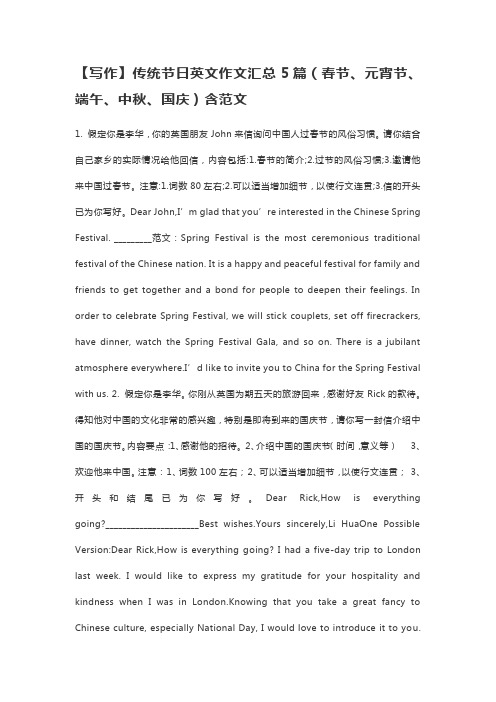
【写作】传统节日英文作文汇总5篇(春节、元宵节、端午、中秋、国庆)含范文1. 假定你是李华,你的英国朋友John来信询问中国人过春节的风俗习惯。
请你结合自己家乡的实际情况给他回信,内容包括:1.春节的简介;2.过节的风俗习惯;3.邀请他来中国过春节。
注意:1.词数80左右;2.可以适当增加细节,以使行文连贯;3.信的开头已为你写好。
Dear John,I’m glad that you’re interested in the Chinese Spring Festival. _________范文:Spring Festival is the most ceremonious traditional festival of the Chinese nation. It is a happy and peaceful festival for family and friends to get together and a bond for people to deepen their feelings. In order to celebrate Spring Festival, we will stick couplets, set off firecrackers, have dinner, watch the Spring Festival Gala, and so on. There is a jubilant atmosphere everywhere.I’d like to invite you to China for the Spring Festival with us. 2. 假定你是李华。
你刚从英国为期五天的旅游回来,感谢好友Rick的款待。
得知他对中国的文化非常的感兴趣,特别是即将到来的国庆节,请你写一封信介绍中国的国庆节。
内容要点:1、感谢他的招待。
2、介绍中国的国庆节(时间,意义等) 3、欢迎他来中国。
- 1、下载文档前请自行甄别文档内容的完整性,平台不提供额外的编辑、内容补充、找答案等附加服务。
- 2、"仅部分预览"的文档,不可在线预览部分如存在完整性等问题,可反馈申请退款(可完整预览的文档不适用该条件!)。
- 3、如文档侵犯您的权益,请联系客服反馈,我们会尽快为您处理(人工客服工作时间:9:00-18:30)。
The Chinese FestivalsSponsored byThe Chinese Festivals occur throughout the Lunar year. As our calendar year and the Lunar year is different, the festivals fall on different dates each year. Each festival is rich on tradition, excitement and participation. The fast pace of Hong Kong slows as the city celebrates in spectacular bright lights and decoration. Festivals are a very important part of Chinese tradition. The particular festivals discussed here are of special interest to the young and knowing a bit more about them will help you enjoy and to participate in these magic celebrations.Chinese New YearThe Chinese New Year is the most important of all the festivals. It is a time of centuries old tradition. The date of the New Year falls somewhere between late January and late February, depending on the Lunar (moon) calendar. A few weeks before, homes are cleaned thoroughly in preparation for the holiday. Tangerine plants, flower displays, Chinese paintings and calligraphy are sold to eager buyers. Hong Kong is laden with brightly coloured decorations, stores are packed with shoppers. The Chinese New Year is a time of settling all debts and spreading good intentions to family and friends.The eve of the New Year is a special time for family and friends. All preparations have been made, including prayer and homage to "Tso Kwan", who returns to heaven to report on the behaviour of the humans for the year. "Tso Kwan" means "Stove Master" and he is the kitchen god of China.The actual New Year day is spent with close friends and relatives, worshipping ancestors and gods. New clothes and new shoes are worn to symbolize the New Year and red packet containing small amounts of money are exchanged. The second day of the New Year is spent with relatives welcoming the beginning of the year. Next is "Kai Nien" or "Squabble Day" on the third day of the festival. It is called this name because it is believed that if you argue on this day, you will have many arguments during the coming year. The fourth day of the New Year is a day of welcoming back the kitchen god from his tiring trip to heaven. A new picture is hung in the kitchen.People honour the "God of Wealth", hoping he will bring great fortune to the family in the coming months. The seventh day of the New Year is "All Person's Day", a day devoted to the celebration of the birth of every person.On the fifteenth day of the New Year, a spectacular three day festival of lanterns begins. Lanterns bearing the symbols of good fortune, happiness and health arepurchased and hung in homes. At the end of the lantern festival, the New Year festivities are over and life in Hong Kong settles back to its normal pace. Throughout the New Year period, "Lion" dances are performed all over Hong Kong and Kowloon. The "Lion" is a huge, multi coloured paper-mache head with a long multi colored train. Two people are inside the head moving the giant puppet with precision and ease from the background drum beat. The lion will move through every emotion, from happiness and gaiety to the deepest sorrow. It takes years of practice to become a professional lion dancer as it requires coordination and skill to "dance the lion". You will hear exploding fire crackers throughout the charged and spectacular celebration.Ching MingThe Ching Ming festival is celebrated in April and is known as "Remembrance of Ancestors Day". This day is devoted to honouring relatives who died. Thousands of Chinese visit cemeteries to clean the graves of their loved ones. The Chinese hold great respect for their ancestors and the young are taught to pray to, and for, the family spirits. Young people accompany their parents to the gravesite and help in the cleaning process. The "willow" is regarded as the symbol of light and enemy of darkness in Chinese culture. On Ching Ming, willow twigs and branches are hung in doorways to ward off the evil spirits. It is believed that if you don't hang the willow, you will appear as yellow dog in your next life!Tin Hau (T'ien Hou)The Tin Hau festival is celebrated on the 23rd day of the Third Moon (late April, early May). The day is set aside to honour a young girl named Mo Niang. She wasre-named Tin Hau, the "Queen of Heaven", and is the "Mother" of boat people and sailors.Tin Hau was born in Fukien in the year 1093. Legend tells a story that she bid her father and brothers farewell as they went off fishing. She went to sleep and had a dream they were drowning. She flew over the waters on clouds and rescued her family just as they were about to drown.Tin Hau is also said to have been able to predict storms and sea traveller's fortunes. She died at the age of twenty and received her title shortly afterwards.There are numerous shrines and temples dedicated to her spirit. On her birthday, the boat people, sailors and those who live on the waterfront, sail to Da Miao (the Great Temple) in Joss HoUse Bay and pay their respects to the goddess, praying for safety in the coming year.Birthday of BuddhaLord Buddha's birthday is another springtimefestival. It is observed on the eighth day of theFourth Moon. Legend has it that at the moment ofBuddha's birth, nine dragons spat on the water.Buddha is the sacred name given to a man calledSiddhartha Gautama, the founder of the Buddhistreligion. He is called Buddha by his followers, whichmeans "The Enlightened One".Buddha lived about 2,500 years ago. Although the facts of his life are scarce, his followers recorded his teachings. He believed in the search for one's self. The Four Noble Truths are the core of his teachings. First is the noble truth of unhappyness in life, then the truth of the cause of unhappyness, and the noble truth of the way to stop unhappyness, and finally, the noble truth of that which leads to the end of unhappyness. Compassion is the significant base of Buddhist life.There are many Buddhists in Hong Kong and many temples and shrines. On the birthday of Buddha, also called the Festival of Ten Thousand Buddhas, his religious followers pray for the washing away of sin and the attainment of wisdom and peace.Cheng Chau Festival (Festival of the Bun Hills)The Cheung Chau Festival begins on the eighth day of the Fourth Moon and lasts for four days. It is one of the most unusual and dangerous of all Chinese festivals. Four days of religious rites, Chinese operas and the burning of paper clothing as gifts, is supposed to make ghosts and edgy spirits happy. Hong Kong takes on a party like atmosphere, with processions and celebrations at every turn.Huge structures towering in the sky have been built and covered to the top with bread buns. In the past, a signal was given and the young scrambled up the towers, picking as many buns as they could hold. It is believed the more buns you grabbed, the more good luck blessings you received. The date and time of this unique ceremony are announced a week before.The processions and parades held during this time are spectacles of colour. People dress up as legendary figures, ride on flowered floats and walk on stilts. The young play a major role in the processions with children perched above the crowd in makeup and costumes. They almost seem suspended in air.Tuen Ng (Dragon Boat) FestivalDragon Boat Festival is an exciting event in Hong Kong. Itis held on the fifth day of the Fifth Moon, usually in June.The day is set aside to honour the death of Wut Yuan, thefamous Chinese port and patriot.Chu Yuan was a high court official of the State of Chu in the period of the warring states. Wut Yuan wrote beautiful and passionate poems for his country, against the evil officials.Eventually, he became disillusioned and he took his own life by drowning himself in the Milo River. People were so upset by the loss of Wut Yuan, they took to boats and beat the water with paddles to stop the fish from eating his body. They also threw rice dumplings into the water to tempt the fish away from their hero.Today, the Dragon Boat races commemorate Wut Yuan's death. The boats, ranging in length from 45 to 120 feet long, are decorated with colourful pennants and a fierce head of a dragon at the front of the boat, driving it on to victory. The dragons are searching the water for Wut Yuan's body, symbolically, of course.Dragon Boat races are held at Yaumati Typhoon Shelter, Aberdeen, Shaukiwan and Stanley Beach. Many local companies sponsor dragon boat teams. Practice and precision are needed to become part of a team. Picnics and festivities on the beaches, as well as the excitement of the races, make this a day not to be missed.Mid Autumn FestivalThis festival is held on the fifteenth day of the Eight Moon and its popularity and participation for the young is second to the New Year Festival.During the Tang Dynasty (618 - 907), Chinese leaders took up the practice of watching the moon. This day is set aside just for this purpose. People travel to high places to make sure they have a good view of the moon. Traditionally, children carried lanterns of animal shapes lit by candles.Now, the lanterns are found in every shape and material imaginable. Dogs, cats, airplanes, yachts, speedboats, pictures of gods, sharks and assorted fish lanterns are sold at very reasonable prices at the Chinese Emporium, all Chinese department stores and in market stalls.As darkness approaches, the hills of Hong Kong, Victoria Park, the Peak, and the beaches are shimmering with the glow of lantern lights. It seems as though a sprinkling of stars have descended on Hong Kong. This night is an event no one under the age of 100 should miss. It is an evening for children of all ages."Mooncakes" are also an important part of the festivities. Many years ago in the 14th Century, a revolt against the Mongols developed, and messages of the revolution were written on paper, then baked into the cakes. The secret messages were smuggled to the revolutionists. Things are much tamer now, and the mooncakes are given to friends and relatives during the festival. These pastries are a mixture of ground lotus,mashed beans, sesame seeds and dates.Lantern festival is a magic time for the young as they carry their lamps lighting the way for adults to pay their respects to the moon. It is a Chinese festival in which children of all nationalities take part.Useful and Interesting InformationAbacus - An abacus is a calculator, rectangular in shape. It has an outside frame with sliding beads strung on thirteen wires or wooden slats. The abacus was used widely before the nine plus "O" counting method was adopted. The Chinese have used it for hundreds of years and still use it today. You will see it used in some Chinese shops. It can somewhat confusing for the observer as the seasoned user quickly slides the beads back and forth, doing the calculation quickly on the abacus. An abacus can be purchased very inexpensively at any Chinese department store complete with an instruction booklet which shows you how to use this ancient calculator.Acupuncture - Acupuncture is the centuries old Chinese method of piercing the body with needles to relieve aches and pains. Chinese legend holds that over 5,000 years ago a soldier was struck with an arrow. He felt a numbing sensation in a different part of his body. The Chinese tell that from this incident came the art of acupuncture. This method treats malaria, high blood pressure, appendicitis and, acupuncture is also used as anaesthesia. The acupuncturist is trained to insert needles painlessly into certain points of the body. The needles are placed in very specific points, depending on the sickness being treated. The instruments and rubber dolls, complete with the proper "points" outlined in colour, are sold in Hong Kong. It takes great skill and years of training to become an acupuncturist.Beijing - Beijing is the official Chinese Mandarin name for the capital city of the Peoples Republic of China, Peking.Buddha - Buddha refers to Prince Siddhartha Guatama, an Indian prince who lived more than 2,500 years ago. After years of study and contemplation, Siddhartha founded the Buddhist religion, based on the "Eightfold Path". Buddha means "The Enlightened One", and by following the teachings of Buddha a person may overcome the craving of earthly pleasures and become enlightened. These paths include the understanding of the Four Noble Truths, correct thoughts, correct speech, proper actions, the right work and efforts, the right state of mind and the ability to concentrate. Buddhism has remained a simple and democratic religion through the centuries. This may explain how quickly it was accepted by the working people of Asia. There are numerous Buddhist places of worship in Hong Kong and Lord Buddha's birthday is a very important celebration for the Chinese.Cantonese - Cantonese is a "spoken" language called a dialect. It is based on a tone approach to speech, and there are up to ten tones in this language which is spoken by millions of Chinese. The official language of China is called Mandarin but most of the residents of Hong Kong speak Cantonese.Chinese Food - Chinese food tastes very good and is also nutritious. The food is prepared with great care and cooked quickly so as not to lose its vitamin content. Vegetables are finely chopped or diced and because of the quick cooking, retain their fresh taste and garden colours. Spices and sauces such as soy, oyster, sesame and aniseed are used freely in Chinese cooking. The Chinese do not waste anything. Every stalk and bone is used for some tasty dish. Different provinces reflect their eating habits by the particular spicy, bland or colourful food they prepare. Hong Kong is an excellent place to try all types of Chinese food, including sharks fin soup, snake meat and sea slugs!Chopsticks - The Chinese eat their food with chopsticks. Chopsticks are a pair of slender sticks made of wood, ivory, bamboo or plastic. It does not take long to learn to use chopsticks, just patience. Trial and error is the best method of mastering the sticks.Dragon - The dragon is a mythical monster in fairy tales and legends. For a long time the dragon stood for evil. Tales of serpent monsters roaming the earth devouring everything in their paths have been recorded for centuries. However, the Chinese adopted the dragon as a symbol of nobility. Until 1912, the dragon was the national emblem of China. Many Chinese consider the dragon a god, one to be worshipped. Therefore, dragons appear in every area of Chinese culture. They decorate colourful lanterns at festival time, shop fronts at Chinese New Year and are delicately embroidered on silk clothing and wall hangings. The dragon has always played a major role in Chinese literature. Children's books are full of the legendary appearances of dragons and, frequently the dragon is found helping a poor orunfortunate victim overcome his enemies. During Dragon Boat Festival, giant heads of the serpent, decorated with fierce markings are painted on the front of the boat, helping the crew to victory. Dragons have always played a busy role in the life of the Chinese people.Dynasty - A dynasty is a group of rulers from the same family who succeed one another in power. This group usually has great wealth and power for several generations. China is the home of great dynasties, dating back centuries. This form of rule in China ended with the overthrow of the Manchu Dynasty in 1912.Eggs - "100 year old eggs", is a term referring to aged eggs, by no means 100 years old! The eggs sold in the markets and restaurants are usually a few days old. They are duck eggs which are soaked for a few days in a solution of tea leaves, lime, soda and rock salt. These eggs are eaten with ginger and are considered a delicacy among the Chinese.Ferries - Ferries are a vital part of Hong Kong life. Hong Kong, being an island, is separated from Kowloon by the famous harbour. The boat ferries provide cheap, efficient transportation for the millions of daily travellers to and from Hong Kong and the neighbouring islands. The most famous is the Star Ferry which runs between Hong Kong, Star Ferry Pier and Ocean Terminal, Kowloon side. Thousands of people take the quick ride to avoid the horrific Hong Kong traffic.Fung Shui - "Fung Shui", translated as, the influences of wind and water, is the Chinese science of "reading" nature in order to ward off evil spirits and bad luck. By the twelfth century, fung shui played an important role in all aspects of Chinese life, from birth till death. A compass with a magnetic centre and seasonal markings is used by an accomplished fung shui artist to choose the site of a person's new home or burial place. This is done to avoid offending demons, invisible ones of course, who inhabit the earth. Offending nature will cause great ills to fall upon you and your descendants, according to Chinese belief. Now, this practice is most popularly applied to graves. If a grave is placed in the wrong area or facing in the wrong direction, ill fortune will follow the family members of the deceased. A fung shui specialist is often called to a building site to assure the builder of the correct direction of the structure.Gwai-lo-(female, gwai-paw) - This is the name given to Caucasian men by the Chinese. The term means "Foreign Devil" in Chinese. In years past, gwai-lo was considered an unpleasant name to call someone, but it is now an accepted word without causing bad feelings.Ginseng - Ginseng is a plant from China. It has an aromatic root which is used in medicine by the Chinese. The Chinese believe it cures many ills. A favourite way of staying healthy is to drink ginseng tea.Harbour - Hong Kong has one of the finest natural harbours in the world. It can be approached from east to west and with its depth of 28 - 36 ft., ships of almost any size can enter the harbour with ease. The harbour is one of the most important elements of Hong Kong's success. The early and still thriving economy of Hong Kong was based on mercantile shipping. The perfect harbour provided this base. There are over 2,200 junks and lighters to load and unload cargo from the massive freighters. Scurrying among the ships are the ferries, taking people to and from Hong Kong, Kowloon and the over-islands. The harbour is often called one of the wonders of the world.Incense - Incense is a substance which produces a sweet aroma when burned. The Chinese use it during most festivals and burn it in honour of the gods and in memory of deceased family members and, for good luck.Jade - Jade, the green stone, is sold everywhere in Hong Kong. From bangle bracelets and images of Buddha, costing only a few dollars, to expensive carved dragons, jade is a popular item to the Chinese and visitors alike. The inexpensive articles are not jade, but are soapstone. Real jade is expensive and sold in quality shops. The emperors of China held jade in great esteem and adorned their homes, places of worship and themselves with it. Jade is still considered a precious stone by the Chinese and all types and qualities can be found in Hong Kong.Junk - A junk is a Chinese sailing vessel. They are easily recognized by their bamboo sails and flat fronts. The Chinese have been using junks for centuries and little has changed in the original design. Marco Polo wrote of the Chinese junk in his log, and commented on the clever Chinese who had invented the first ships to have watertight compartments. He saw one junk with thirteen compartments and the fisherman explained to him that if water came into on compartment, they would seal that compartment off, thus cutting the leak and saving the boat. A junk usually has three sails made from sewing strips of light bamboo into straw. There is a foresail, a mainsail and in the stern, a mizzen sail.Kites - Kites are, and always have been, an intricate part of Chinese culture. It takes many years to become a master kitemaker, although most Chinese boys and girls learn to make their own kites at an early age. Traditionally, kites appear mostly at festival times, especially in the late autumn at the Festival of Climbing the Heights. On this night, people take their beautiful kites to high places and fly them into the night when they attach small lanterns to the kites. These glowing spectacles rise high into the night and the owners try to knock each others kites out of the air. The kites are quite complicated to make, but turn into lovely butterflies, birds, flowers and animals. Kites can be purchased very inexpensively in most stores in Hong Kong.Kung Hei Fat Choy - Kung Hei Fat Choy is the translated expression for "Happy New Year". During the Chinese New Year, you will hear it repeated by one and all and see it written on colourful banners on shops, banks and - well, everything!Lanterns - Lanterns have been part of Chinese life for centuries. Chinese emperors had lanterns hanging in their gardens, on boats, in their homes and temples. This tradition continues to the present day. The colourful lamps appear throughout the Chinese year, especially at festival times. At the end of the Chinese New Year celebration, on the fifteenth day of the first moon, the Festival of Lanterns takes place. Silk, paper and plastic lanterns in round, square and various other shapes are paraded through the streets and hills of Hong Kong. Lanterns on wheels, animals, birds, flowers, boats, every shape imaginable appear in shops and department stores. In the autumn, another festival of light is held and the beaches and hilltops are aglow with soft light. The lanterns are very inexpensive to buy and apart from the actual use of lighting them, they make beautiful decorations.Lion Dance - A lion dance isperformed at most Chinese festivals.The beating of drums is thebackground music for the fearsomedancers. Two people wear a colourfulpaper-mache lion head and withcoordination and skill they movethrough the motions, expressing thefeelings of the lion at the time. The lion may be bashful, playful or even angry and the steps of the performers convey this to the audience. The dance of the lion has been performed for centuries in China.Mahjong - Mahjong is an ancient Chinese board game played with plastic or ivory tiles. Each player receives thirteen pieces and when play starts a great clattering is heard from the shifting of the tiles on the board. Mahjong is one of the most popular pastimes of the Chinese. The tiles can be heard smashing long into the night.New Year - The Chinese celebrate their New Year according to the Lunar calendar. This is the most important of festivals. The New Year is a time for house cleaning and the settling of all debts. Family and friends gather for the festivities which include firecrackers, elaborate food, the exchange of money in small red packets and the honouring of various gods. Most shops are closed for a few days during the New Year.Paper Cutting - Paper was invented by the Chinese during the Han dynasty, (207 BC - 220 AD), and historians believe the art of paper cutting may have started about this time. For centuries, Chinese girls have learned this art as a natural part of their girlhood education. The paper cuts were used to decorate the somewhat drabhomes of the time. Thin paper is used and the subject matter is varied. Fierce dragons, gentle flowers, young maidens, birds and the gods are among the topics cut, always symbolizing good fortune and luck. Paper cuts are very inexpensive and can be purchased at any of the Chinese department stores and shops in Hong Kong.Rickshaw - A rickshaw is a wooden seat balanced on two wheels and pulled by the strength of one man. The rickshaw is quickly disappearing in Hong Kong. It seems unbelievable that in days past, the rickshaw was a useful means of transport. People were pulled up to the peak and all around the island, in every type of weather. Now, the drivers wait for tourists at the Star Ferry Pier as this mode of transportation is long out of date.Silk - Silk, the luxurious cloth, was discovered, or invented by the Chinese. Many centuries ago, there lived an emperor named Huang Ti, called "The Yellow Emperor". His wife, Empress Lei- Tsu, discovered that by unwinding the cocoon of a worm that ate mulberry plants, a shining strong thread could be taken out. She and some of her maidens wove the thread and invented the fabric of silk. The worms were called "silk worms" and soon they were raised and harvested for the purpose of producing silk. This discovery remains with us to this day when the Chinese are still considered the finest silk merchants in the world. Silk of all colours and qualities can be purchased in Hong Kong.Typhoon - A typhoon is a tropical storm with high winds. The word means "Big Wind" and Hong Kong is often affected by these fierce storms. Typhoons most often occur between July and September. The news and weather reports track a storm's movement and there is usually plenty of warning before the typhoon strikes. Signals are hoisted at various points around Hong Kong indicating the intensity of the approaching storm. Any telephone directory has an explanation and further information on typhoons printed in the first part of the book.Writing (Chinese writing) - The Chinese language, when spoken, can vary greatly from province to province. In some cases, a man from one area of China cannot even understand the language of a fellow country man from another area. However, all Chinese read and comprehend the same written language. Chinese writing dates back at least 3,500 years. The Chinese use symbols called characters, made with strokes of a pen or brush. About 3,000 symbols are needed by any person for everyday living. It takes the knowledge of at minimum 7,000 characters to read a newspaper. Because of the type of drawing needed to write in Chinese, it is considered an art and children learn to drill in practice at a very young age.Yin and Yang - In ancient times, the Chinese explained the balance of the world in terms of the Yin and the Yang. They believed there to be two forces behind all things in life. The bright force, full of warmth and light, is called the Yang and the other dark, cold and solid force is called the Yin. These two forces are always opposing each other and when one or the other dominates, there is confusion and the worldis out of sorts. The earth, heavy and dark, is the Yin while the light, air and sun are the Yang. Maintaining and balancing of the Yin and Yang became part of everyday Chinese life and to this day, the Chinese seek to keep a moderate level in all areas of existence.Zodiac - The Chinese put great faith in the stars and their lunar calendar is based on the movement and position of the heavens, the Zodiac. Each year is titled "Year of the ..." particular zodiac animal with certain animals representing luck, wisdom, laziness, strong character and so on.。
